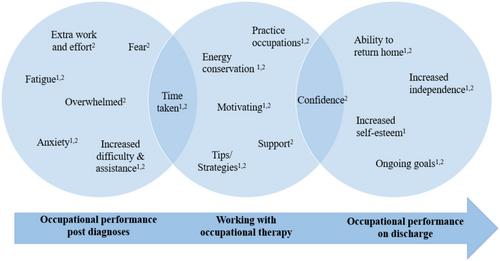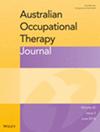Occupational therapy practice for post-acute COVID-19 inpatients requiring rehabilitation
Abstract
Introduction
COVID-19 caused significant occupational disruption to people's life roles, with some people requiring an inpatient rehabilitation admission. Occupational therapists assessed and treated these patients using previous knowledge of similar conditions due to limited specificity in available guidelines to inform practice. The aim of this study was to investigate current practice with post-acute COVID-19 (PAC) patients within an inpatient rehabilitation setting in Australia, to better understand the role and impact of occupational therapy.
Methods
A mixed-method study was conducted, including electronic medical record audits (October 2021 October 2022) and descriptive patient interviews at a large metropolitan subacute service. Descriptive statistics and qualitative analysis were used to summarise and interpret data.
Consumer and Community Involvement
No involvement.
Results
A total of 24 patient electronic medical records were audited, and 10 patient interviews were completed. Three overarching categories were identified within the 685 occasions of occupational therapy service audited—occupational engagement, education provision and discharge planning. Patients identified the value of occupational therapy by reflecting on their lived experiences of engaging with occupational therapists and associated changes in occupational performance between COVID-19 diagnoses and discharge home.
Conclusion
Occupational therapists possess a unique skill set that directly addresses the occupational needs and priorities of PAC patients. This study adds to the growing body of evidence supporting the contribution of occupational therapy to the management of COVID-19; however, further research is needed to develop evidence-based practice resources and advocate for system changes that improve quality of life for COVID-19 patients.
PLAIN LANGUAGE SUMMARY
During the COVID-19 pandemic, a lot of people got very sick. Some of these people needed more time and support to get better. Occupational therapists were important during this time because they helped these people to do their daily activities again. Because there were not many resources on how to do this, we looked into what occupational therapists were doing to help these people. We looked at patient hospital files and also talked to them to understand this better. We found that occupational therapists focused on three main areas: helping patients do activities that were important to them, teaching them about COVID-19 and helping them plan to leave the hospital. This study shows that occupational therapists are skilled at helping people with COVID-19. But more research is needed to make resources and also help with changing the healthcare system to further help people get better from COVID-19.


 求助内容:
求助内容: 应助结果提醒方式:
应助结果提醒方式:


